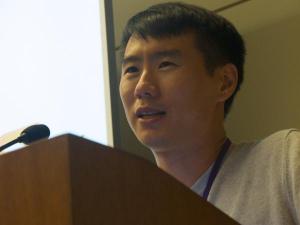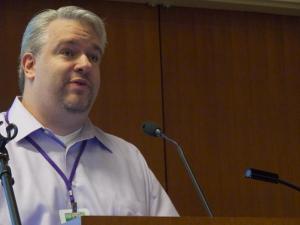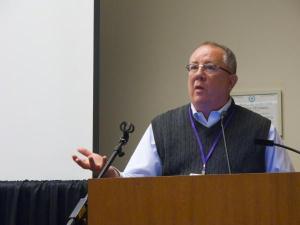By Colin Weatherby
“How many of you use Wikipedia in your research?”
Moderator Nancy Shute began the “Wikipedia: The best, most hated resource for science communicators” seminar at ScienceWriters2012 by posing this question to the audience. Dozens of sheepish science writers slowly raised their hands and a nervous giggle filled the room.Wikipedia is a taboo word in the journalism community, but new data presented at this year’s annual conference in Raleigh, N.C., shows compelling evidence that the wiki model is useful and surprisingly accurate tool for distributing trustworthy scientific research.
The panel focused exclusively on the use of Wikipedia in the medical research community. Andrew Su, PhD, of the Scripps Research Institute discussed a project called Gene Wiki. The project created more than 10,000 basic “stub” articles related to human genes pulled from documents found on PubMed. “The thought process is that people are more likely to contribute knowledge to these articles if they already exist,” said Su.
After a decade analyzing the habits of volunteer Gene Wiki editors, Su has compiled a wealth of data documenting the project’s accuracy and comprehensiveness. He found that pages were vandalized in only 1.1% of the edits and the inaccurate information rarely persisted for more than three days. This means that three of every 10,000 users would stumble upon tainted material. The rate of misinformation for the entirety of Wikipedia is nearly 20 times higher.Panelist Kevin Clauson, Director of the Center for Consumer Health Informatics Research, believes the relative accuracy of science articles on Wikipedia is compelling evidence that the site has a growing and vital role in assisting the public with personal healthcare decisions.
In his research, Clauson compiled findings from multiple studies of online health-related web searches. He argues that pharmaceutical information on Wikipedia is more up-to-date than vetted sources like WebMD, but it is also more likely to contain large holes in its coverage. Currently, very few protocols are in place to fill the omission gap.
“Over half of the people that are looking online for health information make decisions about their treatment based on what they find online,” said Clauson, citing data from a study conducted by the Pew Internet & American Life Project. Most health-related searches direct users towards Wikipedia, which could potentially be a positive development in medical treatment, although Clauson argues that major policy changes by international governing bodies like the WHO will be needed to ensure improved information quality.The final panelist, Rick Borchelt of the National Cancer Institute, announced provocative new information policies formed in an effort to address some of the gaps discussed in Clauson’s presentation. The NCI is now incorporating news releases into Wikipedia articles and plans to add information from its news archive dating back to 2010.
Borchelt underlined the fact that the new procedures go largely unquestioned by the Wikipedia community because NCI research is a widely trusted resource, but he acknowledged that the same practice by a more controversial organization would probably not be accepted so readily.
The seminar was a fascinating insight into the changing influence of Wikipedia on science information and further evidence that the website may one day be embraced by science writers with open arms and a clear conscience.






